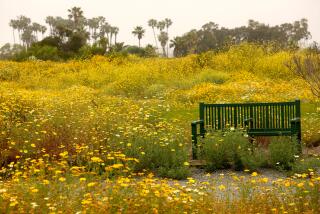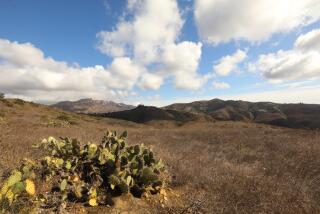Developer’s Study Says Wetlands in Peril : Bolsa Chica: A critic says Koll’s plan to build 4,884 homes next door in exchange for restoring 775 acres of ecosystem is ‘blackmail.’
- Share via
HUNTINGTON BEACH — Wetlands in the Bolsa Chica area are rapidly deteriorating and urgently need restoration, according to a study commissioned by a development company and made public Monday.
The Koll Co., which has offered to help restore 775 acres of wetlands in exchange for permission to build up to 4,884 homes on 405 acres of adjacent land, said its study shows the need to approve their project as soon as possible.
The company announced its findings at a news conference held at Koll’s branch office in Huntington Beach, which was attended by company executives, Orange County Supervisor Harriett M. Wieder and the consultant authors of the study.
But one critic of the Koll Co. reached after the news conference charged that the developer was engaging in “blackmail” by trying to link development to wetlands restoration.
CoOp, a citizens’ group opposed to the Koll plan, said the wetlands can be restored without building nearly 5,000 new homes. “What they’re talking about is blackmail,” charged spokesman Ralph Bauer. “We want to restore the wetlands, but we don’t want that much development.”
The report analyzes 22 years of previous research about the Bolsa Chica wetlands. The conclusion was that valuable plants, animals and marine life are rapidly disappearing from the ecosystem.
“Certain biological resources are becoming less valuable at Bolsa Chica,” said C. Robert Feldmeth of Ecological Research Services, one of the biologists who con
ducted the study. “There are a number of lines of evidence that indicates the habitat is declining.”
CoOp argues that no more than 1,000 homes should be built on the land around Bolsa Chica. Koll Co. officials, however, have said that the overall project, including wetlands restoration, would not be feasible at that size.
Lucy Dunn, vice president of the Koll Co., said it would cost about $100 million to restore the wetlands. She said that the Koll Co. would pay $40 million of that cost. Other agencies and developers who are obligated to replace wetlands, such as the Port of Long Beach, would make up the difference.
Wieder said at the news conference that federal, state and local agencies, as well as the environmental group Amigos de Bolsa Chica, agreed in 1989 to a “coalition plan” that permits Koll to build up to 5,700 homes in exchange for donating 775 acres of wetlands and helping to restore it.
Wieder said the compromise is still the best plan for restoring most of the wetlands of the Bolsa Chica.
Dunn said her company’s development proposal “implements the concept of the (1989) coalition plan and offers the best opportunity to restore the wetlands now at no cost to Huntington Beach taxpayers.”
Another organization that opposes the Koll Co. plan is the Bolsa Chica Land Trust. Founded last June, the Bolsa Chica Land Trust is seeking to raise private and government money to purchase and preserve the Bolsa Chica land.
“We agree that the wetlands are continuing to degrade and need restoring, but we don’t think the Koll Co. plan is the answer,” said Flossie Horgan, president of the trust, which she said has about 500 members.
But Dunn, at the press conference, said, “This land simply is not for sale.”
The Koll Co. plan is scheduled to go before the Huntington Beach City Council for approval in 1993.
The Nov. 3 city election may have lessened the Koll Co.’s chances for winning approval because two new environmentally oriented council members were elected, giving the council a slow-growth majority.
Bolsa Chica Decline? A report released Monday by two researchers says the Bolsa Chica wetlands are deteriorating. The Knoll Co., which has proposed building on land surrounding the ecological reserve, sponsored the study.
More to Read
Sign up for Essential California
The most important California stories and recommendations in your inbox every morning.
You may occasionally receive promotional content from the Los Angeles Times.










